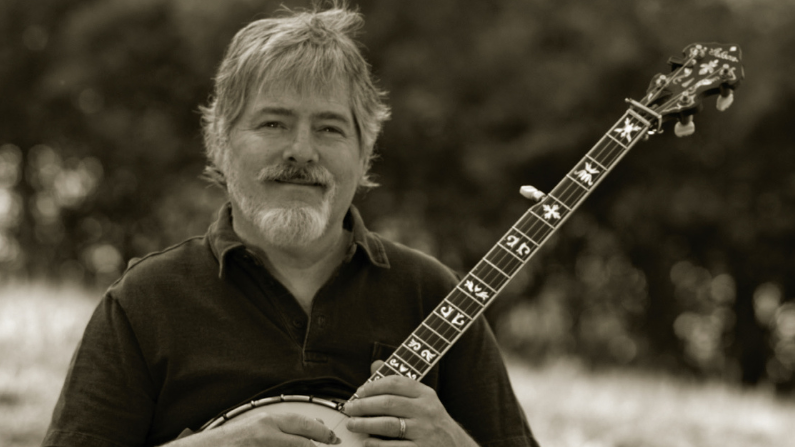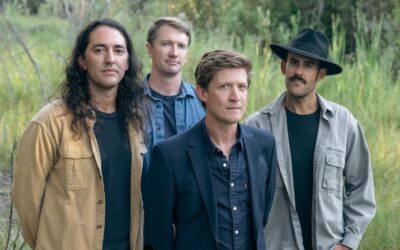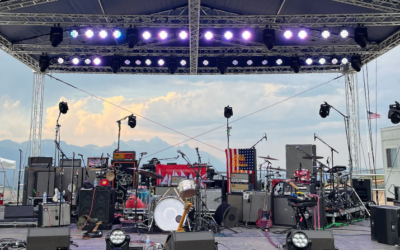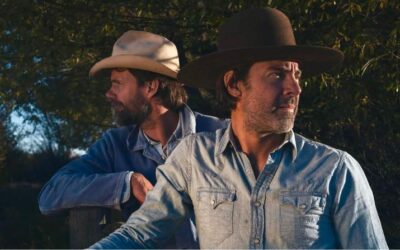With a professional career spanning many decades, banjo master Béla Fleck has showcased the versatility of his instrument to unparalleled effect, picking up 15 Grammy Awards spanning genres from country to world music.
Fleck’s latest album, “My Bluegrass Heart,” sees him reconnecting with some of the most accomplished instrumentalists in bluegrass history.
In advance of his sold-out show at the Center for the Arts in Jackson on Sunday, Dec. 5, Fleck spoke by phone with longtime KHOL DJ Kevin P.
Listen above for more and check out a transcript of the interview below. This conversation has been edited for clarity and brevity.
Kevin P/KHOL: You have a great new album out, ‘My Bluegrass Heart,’ and congratulations, by the way, on your Grammy nomination of Best Bluegrass Album and a fantastic tour celebrating this album, which seems to be half solo and kind of half a new band. So, what can you tell me about this album and the tour?
Béla Fleck: The album is a return to a bluegrass format. I would say a bluegrass format is probably the right way to put it because some of the stuff has a lot of what you think about as traditional bluegrass. Some of it’s a bit progressive, but it’s always a bluegrass band. In a way, I’m stretching some of the idea of what a bluegrass band would do arrangement-wise and voicing-wise. And the other aspect of this album is it’s a big community effort. I started out trying to put together a certain new band and gradually started thinking, ‘Well, why don’t I — why am I not playing with my old pals? I haven’t made a bluegrass record in 20-something years, and why not play with my peer group guys?’ And then I started doing that, and then pretty soon it was like Pandora’s Box, I’m going to play with everybody. And so it ended up a double album. It’s a big creative effort, all around from everybody, that made me feel much more bonded and connected to the bluegrass community.
KHOL: Yeah, there’s a lot of collaborations [on this album]: Sam Bush, Edgar Meyer, Jerry Douglas, Bryan Sutton, Stuart Duncan. How did this band form? I know you go back with these guys a long time, but what came up with that idea?
Fleck: Well, this was really something that was happening spontaneously in Nashville in the ’80s is that all of these [artists] were the cats of the day. So, we found ourselves together doing sessions all the time and [in] creative imbroglios. And, you know, we were our chief collaborators with each other through the ’80s. Jerry, Sam, Stuart, Edgar came in after a while and then Bryan Sutton came in later, and Tony Rice was the guy when you were doing a bluegrass thing, like he was the guy you would try to get. He would make it sound so great, and we made a record called ‘Drive with Tony.’ And all these guys, it was just a real moment for all of us. We all felt like we got something there that was rooted and special, a neat offering to the bluegrass world that was all you know, we were being ourselves very, very much. All of our influences were there, but it was a strong bluegrass moment as a statement from all of us that happened to be under my name.
So at any rate, I decided I needed to do some stuff with all these guys on this record. And then I asked everyone if they wanted to tour. And I’ve already been out on tour with a different cast, which was absolutely an awesome band as well, but a much younger band [featuring] Sierra Hull, Michael Cleveland, Mark Schatz and Justin Moses. And that was a blast. And this is like a different thing. This is like coming home. That was like new vistas, ‘Oh my God, the new guys are just as good and they’re really special and there are new things that can happen with them.’ And then coming and playing with Sam and Jerry, it’s just like, ‘Oh my God, [I’m] just falling into home.’ And you know, this is a lot of music. Like, nobody who goes out on tour on these records is just playing with stuff they recorded — they have to learn a whole show. So, it was a lot of work for everybody. But boy, it’s really, really fun to hear it with this bunch of guys now.
KHOL: So, this is the third album of a so-called trilogy. And what was that all about? Is it because of the bluegrass genre or the band members?
Fleck: I think it’s because I pretty much have been an outsider to bluegrass ever since 1990 when I started the Flecktones. I’ve been off attempting to find a place for the banjo in other musical forms. And I felt like bluegrass was covered, that they didn’t need me. It wasn’t that I didn’t love it, but I had done it. You know, I’d done it since 1976 professionally all the way up to 1990, and I was looking for adventure and I wanted to — I just had a lot of goals that I was trying to try to accomplish, a lot about rights for the banjo, like about seeing it as more than just a bluegrass instrument, which sometimes made people think I didn’t love bluegrass, which is just not true. I’m crazy about it, and I think it’s probably the biggest piece of who I am. But at any rate, I was just doing other stuff. I was playing with Chick Corea. I was going to Africa. I was playing with orchestras. I was playing with Indian musicians, playing with Dave Matthews. I was just getting to do a lot of things that were not bluegrass and that made me a better musician. And when I would come back to bluegrass for a project, you know, I meant to do it more often. It just didn’t seem to happen. But, you know, it took about 12 years between [the albums] ‘Drive’ and ‘Bluegrass Sessions.’ And now it’s been 20-something years since ‘Bluegrass Sessions,’ and it was just overdue.
KHOL: Well, I first saw you in the late ’80s here in Jackson Hole when you were in New Grass Revival and you guys played at The Virginian conference room. It must have been right before you went solo. But then I’ve seen you several times here in Jackson and then a couple of times with Abigail Washburn, your wife, and [at] Austin City Limits Festival one year. And my aunt and uncle in Vermont have a bed and breakfast, and I was visiting after I’d seen you a couple of times and my aunt says, ‘Have you ever heard of Béla Fleck?’ And I was kind of shocked. I was like, ‘Yeah, of course.’ And she handed me a cassette tape, and she said, ‘His mother was just here this weekend. She stayed here and she loves her son.’ And it was so funny to hear that. So, your mom must have come up from New York City and the B&B’s in southern Vermont.
Fleck: So funny. Who would think my mother loved me?
KHOL: Oh my God, she’s so proud of you.
Fleck: Yeah, she’s funny.
KHOL: So, after such a long and storied career, how do you stay fresh and excited to keep creating all this new music?
Fleck: I like a challenge. I like to be doing things. I like to be accomplishing things. So, if I don’t have something brewing, I start getting kind of demoralized. In some people, you would call it a sickness. But in other people, you could call it a healthy, great thing. So, luckily, my compulsion is music, to feel like I’m doing something that I haven’t done before or that I’m contributing, I’m doing something new. I’m being pushed on and not just sitting around. I just want to feel like I’m doing something. Yeah, I mean, I’m the same way at home. At least let me do some dishes, I can’t just sit on the couch. I’ve got to do something. It’s a little attention deficit disorder, perhaps.
I mean, I love when I get a band going and we’re playing music. I love it for a long time. But then at a certain point, I’ve got to do something else. So, it’s been a long time since I’ve been in a band like this. We’ve had two years of being home. Me and [my wife] Abby have been going out a lot over the last while and the Flecktones haven’t been doing much. So, being in a big six-piece band full of music gods is pretty exciting at the moment. I can’t imagine not wanting to do a lot more of it, but I know that when all I did was the bluegrass it started to rub at me. I started to feel that need to go outside. But now it’s been so long that it just feels very soothing and very joyful.
KHOL: Well, I really appreciate you taking the time to talk with us here, and I hope the tour goes great. And I will see you Sunday here in Jackson Hole.
Fleck: Looking forward to it. I love playing Jackson Hole. I’ve gotten to come over the years, I guess since New Grass Revival, that was the first time, but still, every once in a while I get to land there and I always look forward to it. So, we’ll see you there soon.





